 Petzlover
Petzlover Aegean is originated from Greece but Persian is originated from Iran. Both Aegean and Persian are having almost same weight. Both Aegean and Persian has almost same life span. Both Aegean and Persian has same litter size. Both Aegean and Persian requires Moderate Maintenance.
Aegean is originated from Greece but Persian is originated from Iran. Both Aegean and Persian are having almost same weight. Both Aegean and Persian has almost same life span. Both Aegean and Persian has same litter size. Both Aegean and Persian requires Moderate Maintenance.
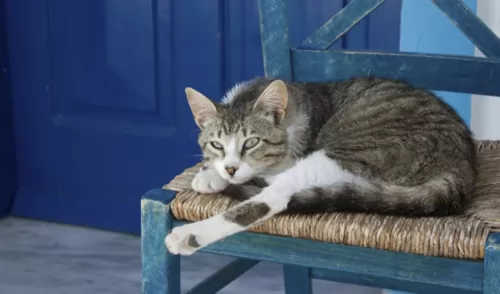 Thought to be the only native Greek variety of cat, the attractive Aegean cats hails from Greece – more specifically the Cycladic Islands of Greece.
Thought to be the only native Greek variety of cat, the attractive Aegean cats hails from Greece – more specifically the Cycladic Islands of Greece.
Formal breeding of the cat started in the 1990s but the cat isn’t recognized by any of the top cat breeding organizations. These cats are believed to be one of the oldest domesticated cat breeds, and in Greece are considered a national treasure.
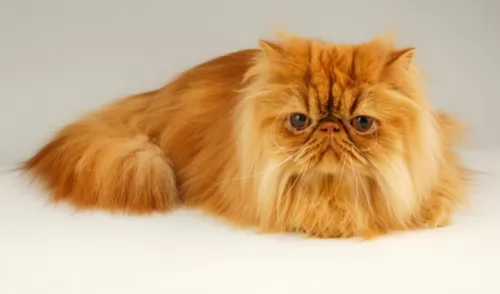 Cat lovers the world over know the Persian cat very well. It's a beautiful long-haired cat breed with its familiar round face and blunt muzzle.
Cat lovers the world over know the Persian cat very well. It's a beautiful long-haired cat breed with its familiar round face and blunt muzzle.
It is not really known when long-haired cats first appeared, or where the Persian originated but their history stems from Persia or Iran as it is known today, where it seems they were first sighted.
The cats were grey-coated and some were white and soon the cats arrived in Britain. They were introduced to the United States in the 1900s. The cat was developed first by the English, and then also by American breeders after the Second World War and the breeding of these cats has also meant a lot of coat colors.
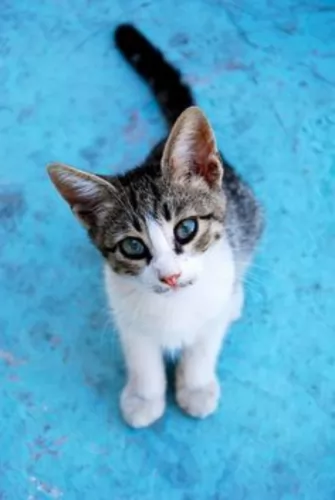 Aegean cats are a nice athletic, medium-sized cat with fairly longish hair and weighing in the region of 4.5 – 5 kg and standing in height at between 21 and 25,4cm.
Aegean cats are a nice athletic, medium-sized cat with fairly longish hair and weighing in the region of 4.5 – 5 kg and standing in height at between 21 and 25,4cm.
The cat sheds during the spring and summer, but if they are essentially indoor cats they will shed all year.
The coat can be made up of two or three colors with white always as one of the main colors and taking up more space on the coat than other colors. Other colors in all their different patterns can be grey, orange or black.
The tail of the cat is long and bushy the ears are quite large and wide at the base and are then gently rounded at the top. The head is broad, the eyes are almond-shaped and can be anything from green to blue or yellow.
These cats are strange in that they quite enjoy being around water, fascinated by the movements below the water’s surface. They’re also social cats, love being around their human family and also around children in the home.
If you have a hobby such as fishing you can take this breed of cat with. In fact, they love the outdoors and if you go out hiking or fishing, they’ll be there, climbing and exploring with you. These attractive cats are known to make awesome family pets, having been domesticated for centuries. Full of energy, they are also quite vocal.
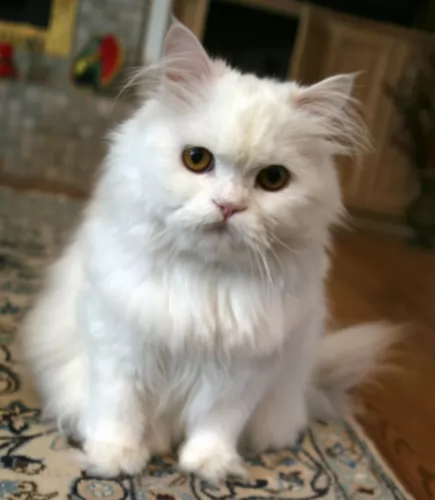 The Persian cat is a medium- to large-sized cat and is heavily boned. He can weigh between 3 and 6kg.
The Persian cat is a medium- to large-sized cat and is heavily boned. He can weigh between 3 and 6kg.
He has stocky legs, a thick neck, small ears, round head, round eyes, and the face is flat or blunt. The kittens are gorgeous balls of fluff.
The coat of the Persian is thick, long, and silky. People many times think only of a white Persian, when in fact the cat comes in many colors and patterns. Eye color for the cat can be blue, green, brown, copper or even odd-eyed.
The Persian isn’t the most active of cats, so attention will need to be given to exercising the cat so as to manage his weight. This cat will also need to have his nutrition controlled to stay in shape and in good health.
Persians enjoy games with their human family and will need some toys to encourage play and exercise.
He is placid and calm but that doesn’t mean he can’t have bursts of energy. They’re quieter than other cats, are sweet-natured, preferring to live in quieter, less boisterous households.
They aren’t loudly vocal but communicate with their eyes and their soft voices. They won’t get on well with small, noisy children but can be loving pets and companions of older children who allow them their own space.
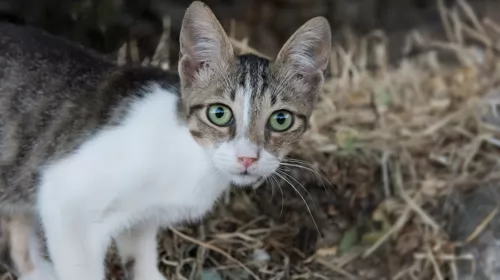 The Aegean is friendly, loving and social and he will get on well with children and animals in the home.
The Aegean is friendly, loving and social and he will get on well with children and animals in the home.
He is intelligent and will try to talk to you, even if it's to invite you to go swimming with him, as he is an unusual cat with his love of water.
Bringing such a cat into your home and heart will promise to bring you years of wonderful companionship.
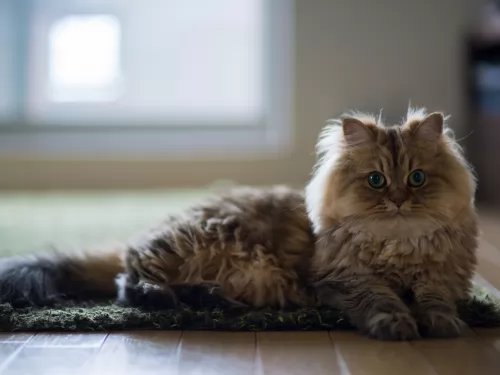 The amicable personality of the Persian cat makes it easy to have these cats in your home. The long hair becomes a bit of an issue as the cat sheds quite a bit.
The amicable personality of the Persian cat makes it easy to have these cats in your home. The long hair becomes a bit of an issue as the cat sheds quite a bit.
They’re sweet, quiet cats and they don’t demand attention from you. They are more than happy just lying quietly in a warm spot. They are calm, loving cats and it's no wonder that they are still such a popular breed of cat.
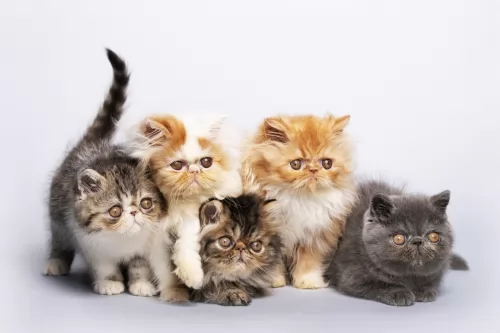 The structure of this cat’s head can mean some health problems. Hereditary Polycystic kidney disease is prevalent with the Persian cat. It is an inherited condition that causes cysts to form in the kidneys. These cysts are actually present from birth, growing larger over time and interfering with kidney function and ending in kidney failure.
The structure of this cat’s head can mean some health problems. Hereditary Polycystic kidney disease is prevalent with the Persian cat. It is an inherited condition that causes cysts to form in the kidneys. These cysts are actually present from birth, growing larger over time and interfering with kidney function and ending in kidney failure.
Also, with a larger breed cat such as the Persian, hip dysplasia is a problem.
Persians are also susceptible to malocclusion which means ‘incorrect bite’. This particular condition can affect the cat’s ability to grasp and actually hold food. So much so in fact, that now pet food manufacturing companies have even developed specially-shaped kibble to cater particularly for the Persian.
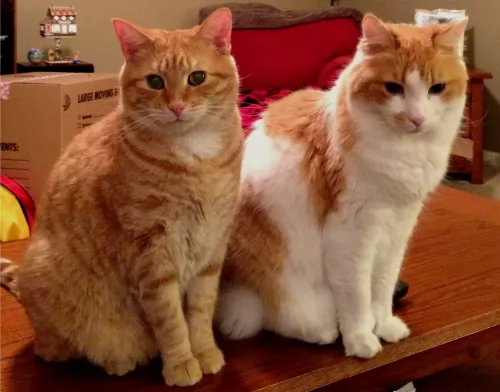 Once you bring a kitten into your home, or any pet for that matter, get to know where your closest vet is. This is so you know where to go if your pet becomes ill, he requires his first vaccines or there is a medical emergency where he needs to see someone immediately.
Once you bring a kitten into your home, or any pet for that matter, get to know where your closest vet is. This is so you know where to go if your pet becomes ill, he requires his first vaccines or there is a medical emergency where he needs to see someone immediately.
When you buy food for your cat, try and buy high-quality food. Speak to your vet if you aren’t sure how to feed your cat. Cats require taurine, which is an essential amino acid needed for healthy hearts. Always make sure your cat has fresh, cool water at all times.
Every cat, whether short- or long-haired will require some combing and brushing to get rid of those loose hairs. The Aegean cat is a moderate shedder. Not only that, if you start with this grooming when your cat is a kitten, he will look forward to it and it will strengthen the bond between you.
Both fleas and ticks can be found on cats, and controlling these kinds of parasites requires speaking to your vet for something that can get rid of them. The vet will recommend products, and a flea and tick collar can also be useful but they will need to be renewed quite frequently.
Your Aegean kitten will need vaccinations to protect him from life-threatening diseases such as Feline Leukaemia Virus, Feline Infectious Enteritis and Cat flu. The first vaccines will be required at 8 weeks of age.
Sometimes it may be necessary to also have your pet vaccinated against rabies, depending on where you live. Throughout your cat’s life, to maintain his immunity, regular booster shots will be required.
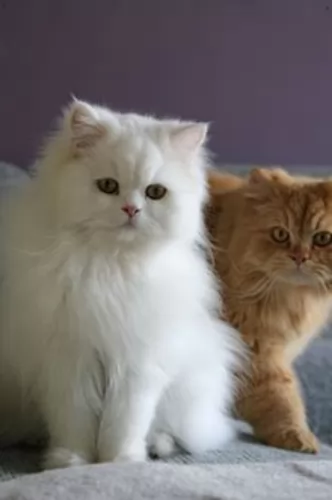 The Persian cat’s coat is long and silky and because he is a fairly heavy shedder, he will require regular brushing – certainly once or twice a week to get rid of that loose hair. It is important to brush and also cut the hair so as to get rid of the tangled knots that form.
The Persian cat’s coat is long and silky and because he is a fairly heavy shedder, he will require regular brushing – certainly once or twice a week to get rid of that loose hair. It is important to brush and also cut the hair so as to get rid of the tangled knots that form.
While brushing your Persian, make sure that his eyes and nose are clear. This is important because the flat face creates problems with these cats.
Excellent cat food for your Persian involves reading labels and understanding what brands are best for your beautiful cat. The Persian cat is a carnivore and will require high-quality food rich in protein.
Speak to your vet if you are in any doubt about the best food for your cat’s health and wellbeing. Make sure your pet has a constant supply of fresh, cool water.
Make sure to keep the litter box clean. Buy a small rake from the pet shop and rake up your cat's feces every single day and dispose of them.